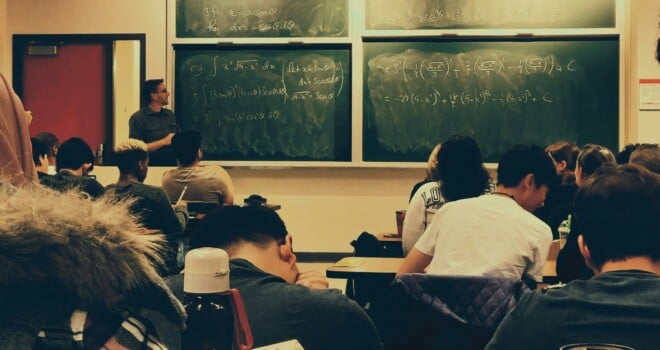The consensus seems to be that today’s students are less capable than in the past. On the surface, this appears to be true. Rose Horowitch, in a deeply reported piece for The Atlantic, discussed how college students at elite institutions are no longer prepared to read books. Likewise, Carley Suthers, for Buzzfeed, collected online comments from educators on this subject. All thought the ability of students, from preschool and up, seems to have declined significantly.
Reasons abound. It’s due to the COVID-related school closures. Or it’s due to the prevalence of technology. Relatedly, it could be due to families no longer encouraging reading at home because of our screen-based culture. All of these, I’m sure, have contributed to this crisis, and it is a crisis. But I’d like to use my experience—I’m a teacher at a standard Catholic high school, meaning the ability levels, as they would at any school, vary—to challenge this prevailing consensus.
What we’re actually witnessing here is a crisis of seriousness. This, to me, best explains the malaise and the decline we seem to be experiencing. And I think people, once presented with serious things, will respond accordingly and appropriately. I’ve seen it happen.
A little background. I had the opportunity to design something of a dream course, which asks students to reflect on the nature of human flourishing. I’ve had them read T.S. Eliot, Flannery O’Connor, Matthew Arnold, selections from the Bible, Simone Weil, Augustine, Aristotle, Thomas Aquinas, and Dante. They had to consider what each thinker and writer said about what a good life looks like. But they also had to put their thoughts into practice. Each time they read, they were expected to conduct a serious conversation about the texts that lasted from anywhere between twenty minutes and fifty minutes. I’d sit back and watch. This, of course, is a technique that’s common at independent schools and classical schools, Catholic or not. So I didn’t do anything out of the ordinary with the students.
They rose to the occasion, and then some. They were thoughtful. They were insightful. And moreover, they developed a bond with each other that I haven’t seen in my years as a high-school educator. It could certainly be due to the fact that there were only ten of them in the course. But I’d like to think they bonded over the material and where it was taking them.
I’ll note, though, that I’m doing this amid a time where institutions are saying that the humanities no longer matter. Colleges and universities are eliminating entire departments—philosophy, English, theology, and the like. You can understand, in a way, why they’re doing this. It’s raw numbers. Students aren’t signing up for these majors, and so administrators, in an attempt to save money, are saying non-vocational programs need to go. And this isn’t something that’s unique to colleges and universities. I’m lucky that I work at a school that allows such freedom in the classroom. Other educators are not so lucky. To offer some extreme examples, consider the teachers who work in districts or schools where texts or approaches are jettisoned from the curriculum, so as to assuage various left or right preoccupations.
All of this is alarming, of course. But also sad. Education isn’t supposed to be some right-wing fad or some left-wing social engineering project. It’s how we form people—as people, of course, but also as citizens, as workers, as spouses. It’s how we form souls, because, by its very nature, a serious education is a moral education. These neo-education wars and the faddish theories that proliferate in education curricula are harming the teaching profession, teachers, and students.
We’re all talking around the real problem here, which is this: we don’t take education seriously anymore. It’s seen as a lengthy path to a job. Everything is about what’s called “career-readiness.” So that means anything that doesn’t align with the mission needs to go. Why teach students to write well, for instance, when they’re going to use a computer in the workplace? Better yet, with AI technologies, they can put their ideas into an algorithmic chatbot and have it organize their thinking for them.
Students are losing these skills because, as a culture, we’re allowing them to atrophy. Our students today are no less capable than they were ten or twenty or even thirty years ago. They’re no less intelligent than they were in the past. But we are denying them their patrimony. And we wonder why they are unable to think critically or read well.
There are class dimensions to this problem, too. Many elite schools, despite what you read or hear in the news, still expect their students to be serious and to read serious things. A quick glance at the program of studies at institutions like Phillips Exeter Academy—which offers courses in Greek and Latin, intensives on Flaubert and existentialist philosophy, and so on—tells you what you need to know. Everyone else, though, is stuck with a system that handicaps teachers and infantilizes students, moving them along until they graduate and either enter college or the workforce. Our schools should be asking students to wrestle with Kierkegaard or Jane Austen. Instead, they’re asking students what they can do to get them to pass. The students taken seriously will ascend. The others will languish. Our society is already bifurcated enough. This will make things worse.
And that brings me back to the class I designed. The students there were capable, thoughtful, and intelligent. But they were very much standard high school students. Reading this material and talking about it seems to have awakened something in them. And I shudder to think of the reality that my course could be their first and last experience of liberal education.
None of this has to be this way.
Photo by Shubham Sharan on Unsplash












